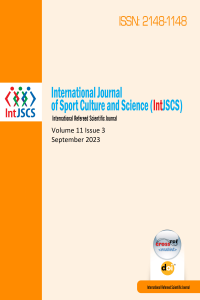Investigating the Relationship between Athletes' Psychological Needs Thwarting and their Psychological Performance
Abstract
The aim of this study is to investigate the relationship between athletes' psychological needs thwarting and their psychological performance. A total of 404 athletes, consisting of 145 females and 259 males actively engaged in football, basketball, volleyball, and handball sports in the research. The data were collected through a questionnaire. The questionnaire items were administered through face-to-face interviews conducted by the researcher and online via Google Forms. The research instruments utilized were the Psychological Needs Thwarting Scale, the Psychological Performance Scale, and a researcher-designed personal information form. Upon analysing the findings of the present study, there were no significant differences in both psychological needs thwarting and psychological performance scale scores based on the variables of sports participation duration and educational background. However, significant differences were found based on the variables of gender, age, and sports discipline. In light of these findings, it is crucial for athletes to effectively manage negative emotional transitions such as anxiety, fear, unhappiness, anger, disappointment, jealousy, resentment, violence, and rage, as they exert a significant impact on competitive success. Therefore, ensuring athletes' internal and external motivation is of pivotal importance. Additionally, in addition to physical training, providing education for athletes to enhance their ability to manage mental processes can be beneficial in improving their performance.
References
- Abiş, S. (2022). Uzun mesafe atletlerinin zihinsel dayanıklılık, Psikolojik performans ve hedef yönelimlerinin Koşu performansı üzerine etkisi, (yüksek lisans tezi), Ondokuz Mayıs Üniversitesi, Lisansüstü Eğitim Enstitüsü.
- Akbağ, M. Ümmet, D. (2017). Predictive role of grit and basic psychological needs satisfaction on subjective well-being for young adults. Journal of Education and Practice, 8(26), 127-135.
- Aras, G. (2019). Farklı lise türlerinde öğrenim gören öğrencilerin beden eğitimi ve spor dersine karşı tutumları ile kişilik özellikleri arasındaki ilişki. (Yüksek Lisans Tezi). Sakarya: Sakarya Uygulamalı Bilimler Üniversitesi, Lisansüstü Eğitim Enstitüsü.
- Aşçı, F. H., Çağlar, E., Eklund, R. C., Altıntaş, A., and Jackson, S. (2007). Durumluk ve sürekli optimal performans duygu durum-2 ölçekleri'nin uyarlama çalışması. Spor Bilimleri Dergisi, 18(4), 182-196.
- Atıcı, A. R. (2023). Ortaokullarda Öğrenim Gören Mülteci ve Göçmen Çocukların Motor Beceri Düzeylerinin ve Beden Eğitimi Temel Psikolojik İhtiyaçlarının İncelenmesi (Doktora Tezi). Aksaray Üniversitesi Sosyal Bilimler Enstitüsü.
Abstract
References
- Abiş, S. (2022). Uzun mesafe atletlerinin zihinsel dayanıklılık, Psikolojik performans ve hedef yönelimlerinin Koşu performansı üzerine etkisi, (yüksek lisans tezi), Ondokuz Mayıs Üniversitesi, Lisansüstü Eğitim Enstitüsü.
- Akbağ, M. Ümmet, D. (2017). Predictive role of grit and basic psychological needs satisfaction on subjective well-being for young adults. Journal of Education and Practice, 8(26), 127-135.
- Aras, G. (2019). Farklı lise türlerinde öğrenim gören öğrencilerin beden eğitimi ve spor dersine karşı tutumları ile kişilik özellikleri arasındaki ilişki. (Yüksek Lisans Tezi). Sakarya: Sakarya Uygulamalı Bilimler Üniversitesi, Lisansüstü Eğitim Enstitüsü.
- Aşçı, F. H., Çağlar, E., Eklund, R. C., Altıntaş, A., and Jackson, S. (2007). Durumluk ve sürekli optimal performans duygu durum-2 ölçekleri'nin uyarlama çalışması. Spor Bilimleri Dergisi, 18(4), 182-196.
- Atıcı, A. R. (2023). Ortaokullarda Öğrenim Gören Mülteci ve Göçmen Çocukların Motor Beceri Düzeylerinin ve Beden Eğitimi Temel Psikolojik İhtiyaçlarının İncelenmesi (Doktora Tezi). Aksaray Üniversitesi Sosyal Bilimler Enstitüsü.
Details
| Primary Language | English |
|---|---|
| Subjects | Physical Training and Sports Pedagogy |
| Journal Section | Articles |
| Authors | |
| Early Pub Date | September 30, 2023 |
| Publication Date | September 30, 2023 |
| Published in Issue | Year 2023 Volume: 11 Issue: 3 |


